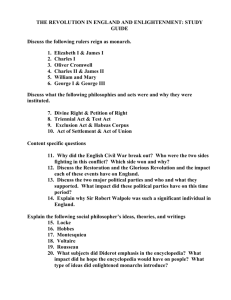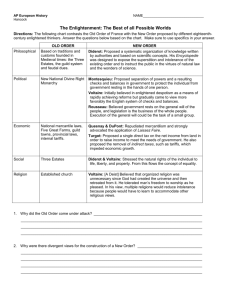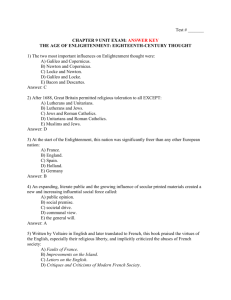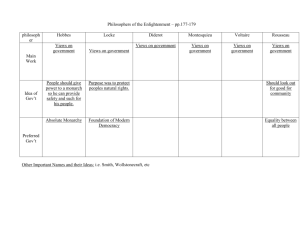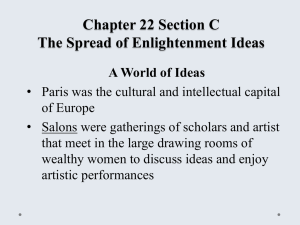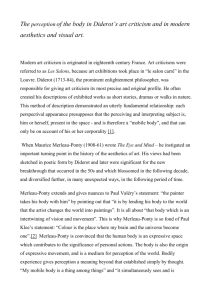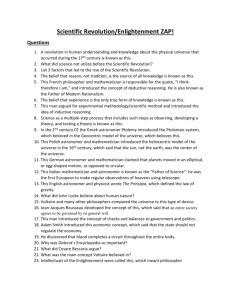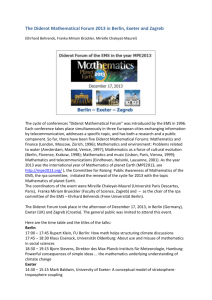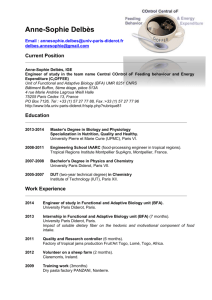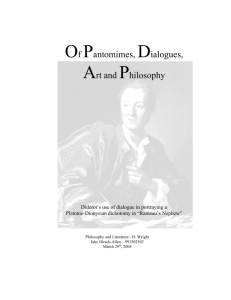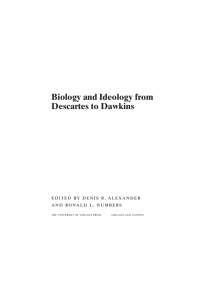History Project Diderot
advertisement
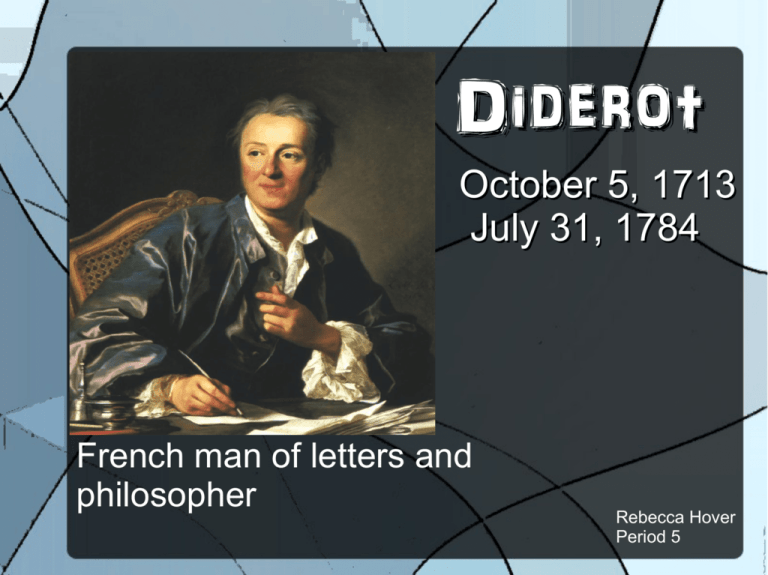
Diderot October 5, 1713 July 31, 1784 French man of letters and philosopher Rebecca Hover Period 5 Early Life Born on October 5, 1713 in Langres, Champagne, France to a well-known cutler. Diderot was first educated by the Jesuits in Langres from 1728 to 1732. From 1729 to 1732 he studied in Paris at the College d'Harcourt or at the Lycee Luois-le-Grand. On September 2, 1732- received the master of art degrees from the University of Paris. Diderot then studied law as an articled clerk in the office of Clement de Ris. He was more interested in languages, literature, philosophy and higher mathematics. To support his family he translated texts from English to French Gained first notice in the 1740s as a translator of English books. Encyclopedie ou dictionnaire raisonne des sciences, des arts et des m'etiers Thought of as one of the “monuments” of the Enlightenment. Had 17 volumes of text and 11 illustrations. It displayed the achievements of human learning in a single work challenged the authority of the Catholic Church. 1745- Diderot became the chief editor of l' encylopedie along with mathematician Jean Le Rond d'Alembert. He contributed hundred of articles, which most of them were on social and religious philosophy. He visited workshops and also factories. There he took notes on all types of manufacturing practices. He also worked with an artists to produce detailed illustrations. The work of the Encylopedie took 26 years of his life. L'encylopedie remains a valuable historical record of the economic practices of the eighteenth century. "The good of the people must be the great purpose of government. By the laws of nature and of reason, the governors are invested with power to that end. And the greatest good of the people is liberty. It is to the state what health is to the individual." Novels, dialogues, and plays Composed most of his own works during this time. Diderot 's most famous plays were Le Fils naturel and Le Pere de famille. Jacques le fataliste and the dialog Le Neveu de Rameau were two of Diderot's most remarkable works. He was also an art critic. Essai sur la peinture (“ Essay on Painting” ) Also wrote Lettre sur les sourds et muets in 1751, Pennsees sur l'interpretation de la nature in 1753, the novel le religieuse in 1760 and the dialogue Le neveu de Rameau in 1761. Lettre surle les aveugles 1749- published the Lettre surle les aveugles, which was an Essay on Blindness. It was used to teach the blind how to read with touch. It also provided Louis Braille to follow in the 19th century. Diderot was arrested and sent in the prison of Vincennes for three months because his work was viewed as “human dependence on sense impression.” Late Life and works 1772- After the completion of l' Encylopedie,it left Diderot with no income. Catherine the Great of Russia bought his library through an agent in Paris. 1773- moved to St.Petersburg and wrote her the plan d'une universite pour le gouvernement de Russie. 1774- worked on a refutation of Helvetius' work De l'homme. Wrote Entretien d'un philosophe avec la marechale and published Essai sure les regnes de Claude et de Neron. Died of emphysema and dropsy in Paris on July 31, 1784 Sources "Denis Diderot." Www.kirjasto.sci.fi. Web. 30 Oct. 2010. < http://www.kirjasto.sci.fi/diderot.htm>. 1757, By. "Denis Diderot - New World Encyclopedia." Info:Main Page - New World Encyclopedia. Web. 28 Oct. 2010. < http://www.newworldencyclopedia.org/entry/Denis_Diderot>. Niklaus, Robert. "EBSCOhost: Diderot, Denis." EBSCO Publishing Service Selection Page. Web. 29 Oct. 2010. < http://web.ebscohost.com/ehost/detail?vid=3&hid=10&sid=0545e640-83e9-4834> 1757, By. "Denis Diderot - New World Encyclopedia." Info:Main Page - New World Encyclopedia. Web. 1 Nov. 2010. < http://www.newworldencyclopedia.org/entry/Denis_Diderot>. The New Encyclopaedia Britannica. 15th ed. Vol. 4. Chicago: Encyclopaedia Britannica, 2007. Print.
